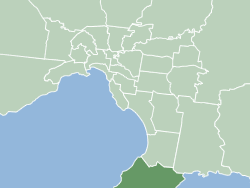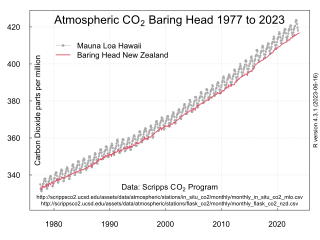
The Shire of Mornington Peninsula is a local government area in southeastern Metropolitan Melbourne, Victoria, Australia. It is located to the south of the Melbourne City Centre. It has an area of 724 square kilometres and in June 2018 it had a population of 165,822.

A state of emergency is a situation in which a government is empowered to put through policies that it would normally not be permitted to do, for the safety and protection of its citizens. A government can declare such a state during a natural disaster, civil unrest, armed conflict, medical pandemic or epidemic or other biosecurity risk.

The City of Merri-bek is a local government area in metropolitan Melbourne, Australia. It comprises the inner northern suburbs between 4 and 11 kilometres from the Melbourne CBD. The Merri-bek local government area covers 51 km2 (20 sq mi), and in June 2018, it had a population of 181,725.

The City of Melbourne is a local government area in Victoria, Australia, located in the central city area of Melbourne. In 2021, the city has an area of 37.7 square kilometres (14.6 sq mi) and had a population of 149,615. The city's motto is "vires acquirit eundo" which means "we gather strength as we go".

The Shire of Livingstone is a local government area located in the Capricornia region of Central Queensland, Queensland, Australia, to the immediate north and east of the regional city of Rockhampton. The shire, administered from the coastal town of Yeppoon, covers an area of 11,758 square kilometres (4,539.8 sq mi), and existed as a local government entity from 1879 until 2008, when it amalgamated with several other councils to become the Rockhampton Region. The Shire was re-established on 1 January 2014 following a successful de-amalgamation referendum in 2013.

The City of Unley is a local government area in the Adelaide metropolitan region. It is located directly south of the Adelaide city centre.

Andrew James Barr is an Australian politician who has been serving as the 7th Chief Minister of the Australian Capital Territory since 2014. He has been a Labor Party member in the ACT Legislative Assembly since 2006, after being elected on a countback to replace former Treasurer Ted Quinlan, who resigned mid-term. Barr was immediately promoted to Cabinet upon his election. On 11 December 2014 he was elected as Chief Minister after his predecessor, Katy Gallagher, resigned and announced her intention to run for the Senate. In addition to being Chief Minister, he holds the portfolios of Treasurer; Climate Action; Trade, Investment and Economic Development; and Tourism.

Port Stephens Council is a local government area in the Hunter Region of New South Wales, Australia. The area is just north of Newcastle and is adjacent to the Pacific Highway which runs through Raymond Terrace, the largest town and Council seat. The area is named after Port Stephens, which is the major geographical feature of the area. It extends generally from the Hunter River in the south, to near Clarence Town in the north, and from the Tasman Sea in the east, to just south of Paterson in the west. The mayor of Port Stephens Council is Ryan Palmer. Palmer was caught in a major scandal in 2022 following the purchase of an $86,000 Ford Ranger for mayoral and personal use. Port Stephens is about two and a half hours north of Sydney.
Same-sex marriage has been legal in Australia since 9 December 2017. Legislation to allow it, the Marriage Amendment Act 2017, passed the Australian Parliament on 7 December 2017 and received royal assent from Governor-General Peter Cosgrove the following day. The law came into effect on 9 December, immediately recognising overseas same-sex marriages. The first same-sex wedding under Australian law was held on 15 December 2017. The passage of the law followed a voluntary postal survey of all Australians, in which 61.6% of respondents supported legalisation of same-sex marriage.

Climate change in New Zealand involves historical, current and future changes in the climate of New Zealand; and New Zealand's contribution and response to global climate change. Summers are becoming longer and hotter, and some glaciers have melted completely and others have shrunk. In 2021, the Ministry for the Environment estimated that New Zealand's gross emissions were 0.17% of the world's total gross greenhouse gas emissions. However, on a per capita basis, New Zealand is a significant emitter, the sixth highest within the Annex I countries, whereas on absolute gross emissions New Zealand is ranked as the 24th highest emitter.

Kausea Natano is a politician who served as the Prime Minister of Tuvalu from 19 September 2019 to 26 February 2024. He represented Funafuti as a Member of Parliament. He was first elected in the 2002 Tuvaluan general election and served as an MP until he was unseated in the 2024 Tuvaluan general election.

Local government in the Australian state of Victoria consists of 79 local government areas (LGAs). Also referred to as municipalities, Victorian LGAs are classified as cities (34), shires (38), rural cities (6) and boroughs (1). In general, an urban or suburban LGA is called a city and is governed by a City Council, while a rural LGA covering a larger rural area is usually called a shire and is governed by a Shire Council. Local councils have the same administrative functions and similar political structures, regardless of their classification.

The Central Coast Council is a local government area in the Central Coast region of New South Wales, Australia. It is adjacent to the Pacific Highway, Central Coast Highway, the Northern railway line and the Pacific Ocean. The council was formed on 12 May 2016 following the merger of the Gosford City and Wyong Shire Councils.

Bayside Council is a local government area in Sydney, New South Wales, Australia. It is located around part of Botany Bay, 7 kilometres (4.3 mi) to 12 kilometres (7.5 mi) south of the Sydney CBD. It includes suburbs of Southern Sydney as well as a small portion in the Eastern suburbs, south-east of the Sydney CBD. It comprises an area of 50 square kilometres (19 sq mi) and as at the 2016 census had a population of 156,058.

Alexander David Sobel is a British Labour and Co-operative politician who has been the Member of Parliament (MP) for Leeds North West since the 2017 general election. He served as Shadow Minister for Nature Recovery and the Domestic Environment from 2021 to 2023.

A climate emergency declaration or declaring a climate emergency is an action taken by governments and scientists to acknowledge humanity is in a climate crisis.

Carla Suzanne Denyer is a British politician who has served as co-leader of the Green Party of England and Wales alongside Adrian Ramsay since 1 October 2021. She has been a city councillor in Bristol since 2015. She is also noted for her lead role in bringing about Bristol City Council's declaration of a climate emergency in 2018, which was the first in Europe.
Persona non grata, in the context of Philippine governance parlance, refers individuals or groups declared as unwelcome in a particular locality. This designation is merely symbolic and non-binding, and does not legally prohibit a person declared as persona non grata from stepping foot on that locality.

Climate emergency declarations have been made by multiple jurisdictions in the United Kingdom, including city, county, and borough councils. Bills to declare a climate emergency have also been introduced in several other jurisdictions.
Climate emergency declarations have been made by multiple jurisdictions in New Zealand, including national, regional and territorial authorities. The first New Zealand´s jurisdictions began to declare climate emergencies in 2019.





























